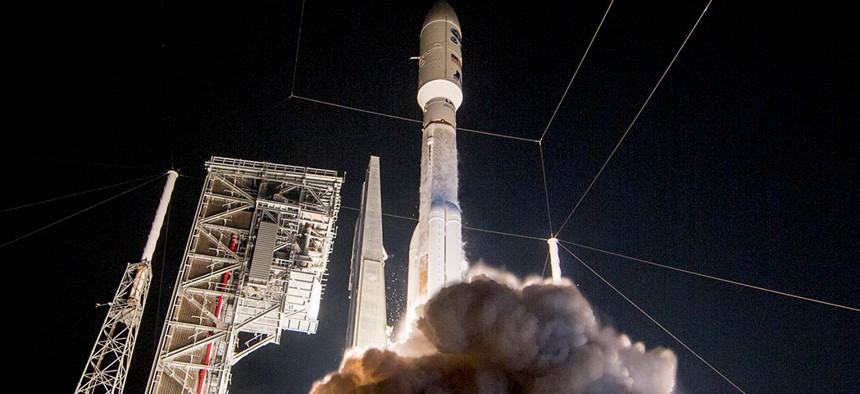NOAA Should Reassess Geostationary Satellite Launch Plans, IG Says

Courtesy photo/ULA
It isn’t the first time the satellite program has come under scrutiny.
The Commerce Department Inspector General warned last week that the National Oceanic and Atmospheric Administration may be increasing risk in the development of its environmental satellites.
According to an audit published Jan. 20, NOAA’s Geostationary Operational Environmental Satellite program, or GOES-R, “works toward the earliest achievable launch date at potentially increased development risk.”
The audit comes as the latest of the four GOES-R Series satellites—GOES T—is scheduled to launch on Feb. 16. The $10 billion GOES program operates a fleet of satellites that orbit 22,300 miles above the western United States and Pacific Ocean and provide scientists and forecasters a wealth of data regarding hurricanes, storm systems, wildfires and, chiefly, cloud and moisture imagery. GOES-T follows GOES-17, which became operational in February 2019 after a series of software glitches and delays.
While auditors stop short of asking for a delay of GOES-T’s launch, they call on NOAA to conduct an analysis of alternatives or assessments regarding whether to continue the GOES program’s approach of “managing schedules toward the earliest possible launch dates.” Auditors questioned, for example, why the GOES program “made changes to the spacecraft propulsion system and test campaign” that ultimately “did not simulate a general mission profile from liftoff to orbit.”
“This means that the GOES-T satellite configuration that entered the test campaign was not the same configuration that will launch and fly on orbit, which is not aligned to the GOLD Rule to “test as you fly—fly as you test,” the audit states. “This rule holds that testing of all critical mission-operation elements (such as the propulsion system) as they will be flown greatly reduces the risk of negative impacts upon mission success, whether from partial or full loss of capability.”
Auditors also found the National Environmental Satellite, Data and Information Services, which manages NOAA’s environmental satellite programs and data, “is planning GOES launches sooner than its policy requires without analyzing the costs” and has not studied tradeoffs of ground storage of prepared satellites.
NOAA ultimately agreed with all five recommendations from auditors, including that the agency conduct an analysis of alternatives regarding how to manage satellite launch schedules.






